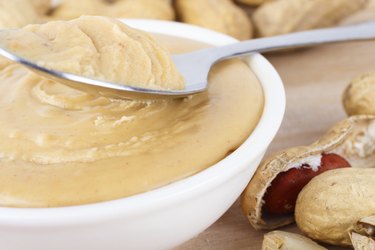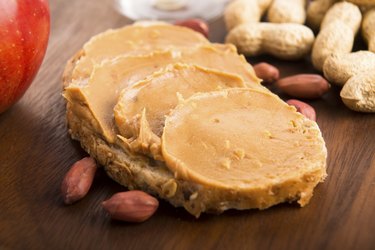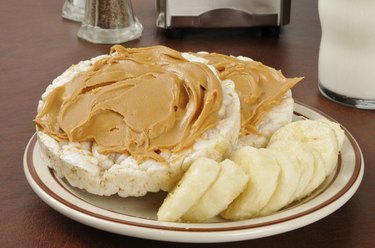
Organic foods, including peanut butter, are grown and made without the use of pesticides and other chemicals. If this isn't enough of a pro to convince you to give organic peanut butter a try, many brands of organic peanut butter are also more nutritious than conventional peanut butter because manufacturers pay close attention to the ingredients included in the recipe. The picture isn't all rosy, however, because there are certain drawbacks to consider before choosing which jar of peanut butter you'll put in your grocery cart.
Organic Foods 101
Video of the Day

Organic foods are grown without the use of pesticides. The U.S. Department of Agriculture notes that organic foods are also grown without the use of synthetic fertilizers, irradiation, sewage sludge and genetic engineering. This means that the food is better for you because you're not being exposed to chemicals and other substances that can harm your health. It also means that farmers and manufacturers are considering the environmental impact of making the food.
Video of the Day
It Might Be More Nutritious

While organic foods contain fewer synthetic chemicals, they aren't always more nutritious, in terms of vitamin and mineral content, than conventionally grown and manufactured foods, according to Jeff Cox, author of "The Organic Food Shopper's Guide." Some organic food manufacturers identify other ways to make certain foods healthier so that the organic product ends up supplying more in the way of vitamins and minerals or less in the way of sugar and salt. Many organic food companies use fewer additives, coloring and preservatives in their foods to further increase the health value, according to Lisa Barnes, author of "Petit Appetit: Eat, Drink, and be Merry."
It Costs More

One primary disadvantage to choosing organic peanut butter is that it tends to cost more than traditional peanut butter. As of 2014, a jar of regular peanut butter might cost $2 or $3, while a jar of organic can cost up to $5 or more, depending on the brand. According to the Rodale Institute, it costs more to grow peanuts organically than conventionally, and that added cost is passed onto the consumer so farmers and manufacturers are able to profit from the product. The cost of going completely organic is daunting to many consumers, who opt instead to pick and choose what foods to buy organic and which to purchase in conventional form.
It Tastes Different

The taste and texture of organic peanut butter can be different than that of traditional peanut butter. This is especially true if the organic peanut butter is also lower in sugar and salt than traditional peanut butter. If you're committed to going organic, it'll take a few tries to get used to the different taste, but over time, you'll adjust and will likely to come to enjoy the peanut butter. In the meantime, combine the organic peanut butter with other ingredients, such as fresh organic fruit or organic jelly, to help your taste buds adjust. Another alternative is to make your own peanut butter, using organic peanuts, of course, so you can control what ingredients you use and, therefore, control the taste.